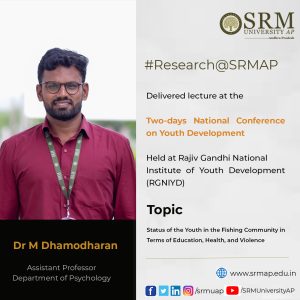 During the Two-day National Conference on Youth Development titled Youth in the 21st Century: Prospects and Psychosocial Challenges, organised by Rajiv Gandhi National Institute of Youth Development (RGNIYD), Sriperumbudur, Tamil Nadu, in collaboration with ICMR – NIRT, Chennai, Dr Dhamodharan, Assistant Professor, Department of Psychology, presented a lecture on Status of the Youth in Fishing Community in Terms of Education, Health, and Violence.
During the Two-day National Conference on Youth Development titled Youth in the 21st Century: Prospects and Psychosocial Challenges, organised by Rajiv Gandhi National Institute of Youth Development (RGNIYD), Sriperumbudur, Tamil Nadu, in collaboration with ICMR – NIRT, Chennai, Dr Dhamodharan, Assistant Professor, Department of Psychology, presented a lecture on Status of the Youth in Fishing Community in Terms of Education, Health, and Violence.
Abstract
Over sixty percent of the fisher population in India is Below Poverty Line (BPL). For traditional fishers, fishing is their primary source of income, and they have no other options. Hence, families in the coastal village are socially, financially, and educationally disadvantaged and frequently face financial difficulties. Additionally, the literacy level of the fishing community is deficient. Fishers have met an unbalanced diet, tension, excessive drinking, tobacco usage, and harmful behaviours. Fisher communities are often underprivileged and constitutionally and communally isolated from other communities. Limited research has been conducted on the fishing community youth, particularly in Tamil Nadu and Pondicherry. Hence, the study needs to be understood and conducted for the fishing community youth regarding education, health, and violence. The empirical study combined quantitative and qualitative approaches to Tamil Nadu and Pondicherry fishing community youth. The study tools used for the data collection are a semi-structured questionnaire for youth for their perspective on health care, school, violence, and family support and a semi-structured questionnaire to the parents regarding their perspective on their children’s education, health, violence, and family support. Twenty case studies were conducted in the selected clusters. Also conducted were key informant interviews with fishing community leaders in four clusters. The results showed that more than 50 % of participants face verbal violence, more than 80 % face physical violence, and nearly 25% face sexual violence. The fishing community is an under-educated, predominantly nuclear family, and the family income is less than ten thousand rupees monthly. Physical abuse had significantly associated with place of residence, Puducherry residing youth had more physical abuse than Tamil Nadu. The social-economic condition of the family and the parental education seemed to be better in the state of Tamil Nadu as compared to Puducherry. Youths from Puducherry had a greater risk of experiencing physical and verbal abuse. Parents had a relatively low level of awareness and understanding of child rights and laws. The study’s results helped to understand the problem of fisher community youth and their perception of parental care, education, health, and violence.
Practical Implementation of the Findings
- Social welfare department and local NGOs to take up need-based intervention programmes for the welfare of the fishing community and youth.
- The youth welfare department understands the problems of youth in the fishing community.
- Policymakers to develop policies and legislation for the youth of fishers in the education and health sectors.
- Understanding the problems and violence against the youth of the fisher community, as well as helping the Non-Government Organisations for making intervention programs at the community level.
- Assist the school administration in better understanding the Fisher community students’ situation and creating counselling centres in school settings.

